|
|
|
Sort Order |
|
|
|
Items / Page
|
|
|
|
|
|
|
| Srl | Item |
| 1 |
ID:
133030
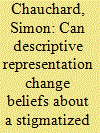

|
|
|
|
|
| Publication |
2014.
|
| Summary/Abstract |
Can descriptive representation for a stigmatized group change the beliefs and intentions of members of dominant groups? To address this question, I focus on quotas (reservations) that allow members of the scheduled castes to access key executive positions in India's village institutions. To measure the psychological effect of reservations, I combine a natural experiment with an innovative MP3-player-based self-administered survey that measures various beliefs and behavioral intentions. Results provide credible causal evidence that reservations affect the psychology of members of dominant castes. Even though villagers living in reserved villages continue to think poorly of members of the scheduled castes (stereotypes do not improve), reservation affects two other types of beliefs: perceived social norms of interactions and perceived legal norms of interactions. These changes in beliefs in turn appear to have far-reaching consequences for intercaste relations, as villagers' discriminatory intentions also decrease under reservation.
|
|
|
|
|
|
|
|
|
|
|
|
|
|
|
|
| 2 |
ID:
096186


|
|
|
|
|
| Publication |
2010.
|
| Summary/Abstract |
During a recent meeting of the APSA Committee on Publications, headed by Lisa Martin, we discussed a proposal that had been put forward to encourage authors to deposit their data in a central repository to provide more centralized access for others seeking to replicate or extend prior work. Such a strategy should ostensibly make it easier for methodological, theoretical, and empirical work to flourish and cumulate.
|
|
|
|
|
|
|
|
|
|
|
|
|
|
|
|
| 3 |
ID:
131682
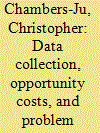

|
|
|
| 4 |
ID:
132672
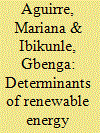

|
|
|
|
|
| Publication |
2014.
|
| Summary/Abstract |
We investigate factors influencing country-level renewable energy growth by applying FEVD and PCSE estimation methods in a unique sample analysis. With a longer time series (1990-2010) and a broader sample size of countries (including Brazil, Russia, India, China and South Africa) than previous studies, our results reveal new insights. The results suggest that certain government-backed energy policies impede renewable energy investments, thus implying significant failures in policy design. These policies may be failing mainly because of uncertainty and the likelihood of discontinuity. Weak voluntary approaches are introduced in order to satisfy public demand for more sustainable investments and programmes; we find that these may have negative influences on the growth of renewables as well. The insight gained is consistent over the estimation methods employed.
|
|
|
|
|
|
|
|
|
|
|
|
|
|
|
|
| 5 |
ID:
032453


|
|
|
|
|
| Publication |
New York, John Wiley & Sons, Inc., 1971.
|
| Description |
vi, 104pHbk
|
| Standard Number |
047107750X
|
|
|
|
|
|
|
|
|
|
|
|
Copies: C:1/I:0,R:0,Q:0
Circulation
| Accession# | Call# | Current Location | Status | Policy | Location |
| 007335 | 658.4038011/BLA 007335 | Main | On Shelf | General | |
|
|
|
|
| 6 |
ID:
144893


|
|
|
|
|
| Summary/Abstract |
The nature of underreporting terrorism in developing countries is often acknowledged but poorly understood. Focusing on India, we triangulate terrorist attacks captured across three media-based datasets (Global Terrorism Database, South Asia Terrorism Portal, Worldwide Incident Terrorism System) against official police records from Andhra Pradesh. Results suggest that media-based datasets capture the geographic prevalence of terrorism yet severely underestimate the frequency of violence, biasing toward lethal bombings. Considerable variation is present for attacks targeting specific classes or types of actors. Similar to other crimes, the results suggest that existing terrorism databases represent a select version of violence in these countries, discounting the prevalence and regularity of non-lethal violent activity.
|
|
|
|
|
|
|
|
|
|
|
|
|
|
|
|
| 7 |
ID:
144089


|
|
|
|
|
| Summary/Abstract |
Violence against civilians is not the only tool among the arsenal of terrorists; it is only one of many. Up until now, there did not exist any quantitative data on the different strategies adopted by terror groups that measured the group’s popularity or its public support. The Reputation of Terror Groups dataset (RTG) addresses this void. To understand which terror groups build different types of reputation, to analyze the consequences of reputation building and how reputation changes with and influences conflict dynamics, we need to be able to measure the loaded concept of reputation. RTG is the first systematic measure for the reputation of terror groups across countries or time. The dataset includes 443 terror groups operating across 31 years, which makes a total of 2,641 observations. The large sample size of the RTG dataset allows comparisons of popularity among groups. Additionally, the dataset adopts a multivariable approach by examining multiple aspects of both positive and negative reputation building. Another novelty of the dataset is its measure of reputation with regard to each target, mainly its constituency and target audience. The RTG data can help us come up with new and novel ways of understanding terror groups, and contribute to bridging the gap between micro- and mezzo-level studies in the literature by showing how terror groups adopt different strategies in their constituency and target audience to pursue their goals. In this article, we give an overview assessment of the RTG dataset, display some interesting trends in the data, and explain the data collection procedure, its challenges, and its limitations.
|
|
|
|
|
|
|
|
|
|
|
|
|
|
|
|
| 8 |
ID:
180189
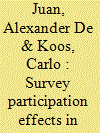

|
|
|
|
|
| Summary/Abstract |
Do survey participants in conflict zones respond differently if they have been interviewed before? Academic and policy interest in postwar political opinion has increased tremendously. One unexpected consequence of this surge of survey research is a growing probability that individuals will be interviewed multiple times. However, if participating in one survey causes respondents to change their attitudes or behavior, their subsequent survey responses may be biased in comparison to the rest of the sample population. Our article aims to investigate such ‘survey participation effects’ in conflict contexts. We draw on original survey data collected in the eastern Democratic Republic of Congo (DRC). In our representative sample, 18% of respondents report that they have been interviewed before. Multivariate analyses demonstrate that their stated attitudes on social relations, political institutions, gender norms, and wartime victimization differ substantively from the responses of first-time interviewees. Moreover, our analyses indicate that experienced respondents have specific response styles – in particular, a tendency to support extreme response options. While substantive bias in multivariate analyses seems to be rather rare, our findings indicate that researchers should be aware of the footprints of data collection efforts in areas frequently targeted by household and opinion surveys.
|
|
|
|
|
|
|
|
|
|
|
|
|
|
|
|
| 9 |
ID:
144894


|
|
|
|
|
| Summary/Abstract |
This study identifies the most efficient methodology for sampling from a population of New York Times articles related to terrorism, which were generated through keyword searching. Efficiency was based on which sample statistic was closest to the population parameters of interest. The smallest sample size, where 68 percent of the sample statistics were within one standard deviation of the population mean and 95 percent of the sample statistics were within two standard deviations of the population mean, were identified as the most efficient. In addition, we determine whether the frequency of news articles is correlated to the temporal distribution of terrorist incidents found in the Global Terrorism Database, which could possibly be utilized to more efficiently sample from the population. Our findings confirm prior research that shows that sampling efficiency is related to the weekly news cycle and, contrary to prior research, the sample must include between 20 to 29 constructed weeks to achieve representativeness of an entire year of coverage for a population generated through keyword searches. In addition, the study also found that there was a limited relationship between the frequency of terrorist incidents and the amount of terrorism coverage in the news.
|
|
|
|
|
|
|
|
|
|
|
|
|
|
|
|
| 10 |
ID:
132357
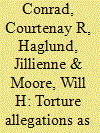

|
|
|
|
|
| Publication |
2014.
|
| Summary/Abstract |
The Ill-Treatment and Torture (ITT) Data Collection Project uses content analysis to measure a number of variables on more than 15,000 public allegations of government ill-treatment and torture made by Amnesty International (AI) from 1995 to 2005. The ITT specific allegation (SA) event data use the torture allegation as the unit of observation, thus permitting users to manipulate them for a wide variety of purposes. In this article, we introduce the ITT SA data. We first describe the key variables in the SA data and report a number of bivariate descriptive statistics to illustrate some of the research questions that might be usefully investigated with the data. We then discuss how we believe the ITT SA data can be used to study not only AI's naming and shaming behavior, but also states' (lack of) compliance with the United Nations Convention Against Torture (CAT). We conclude with an empirical analysis using the SA data that investigates the effect of domestic political institutions on formal complaints, investigations, and adjudication of torture allegations. We show that legislative checks are positively associated with complaints, investigations, and trials; elections and freedom of speech are positively associated with investigations and trials; and powerful judiciaries are associated only with investigations.
|
|
|
|
|
|
|
|
|
|
|
|
|
|
|
|
|
|
|
|
|